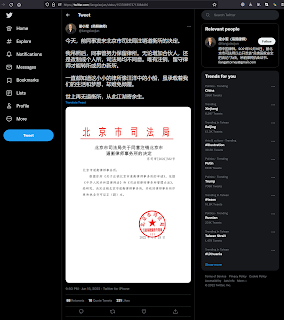If one looks at the first two decades of the 21st century, the three PRC law firms that had the strongest track records for defending civil rights were (in no particular order): Fengrui, Daoheng, and Mo Shaoping.
Fengrui was the primary target of the 7.09 crackdown, and many of its lawyers/employees were imprisoned by the PRC government on subversion/inciting charges, based mainly on their writings/meetings/organizing connected to high profile civil rights cases. I have an entire section of my casebook - "State Prosecutions of Speech in the People's Republic of China" - devoted to those prosecutions. Its available as a free PDF download on my website here - https://www.feichangdao.com/publications/state-prosecutions-vol-1.
Yesterday, Liang Xiaojun, formerly lawyer at the Daoheng Law Firm, tweeted that the Daoheng Law Firm has also been shuttered - https://twitter.com/liangxiaojun/status/1537069973713084416.
Here is a translation of @liangxiaojun's post about the PRC government's revoking the Daoheng Law Firm's operating license.Today, a former colleague sent the decision of the Beijing Municipal Bureau of Justice to cancel the Daoheng Firm.Daoheng and Liang Xiaojun appear in several places in "State Prosecutions":
After my license was suspended, my colleagues tried to keep the law firm going. But whether they tried to add a partner or transform it into a private firm, the Bureau of Justice would not agree. Now with the cancellation, the remaining lawyers can only transfer or set up a new law firm.
We have always known that this small law firm is like a boat in the ocean. Although it carries our life and dreams, it was almost inevitable that it would capsize.
This world will never see another Daoheng Firm, and I will spend my remaining years unanchored and unmoored.
- Liang was one of the lawyers who defended Chen Wei in 2011. A PRC court imprisoned Chen Wei for nine years for subversion for publishing statements on the Internet such as "The people have been deprived of their ideology and belief," and "The entire Communist Party of China utilizes violent mechanisms to control the people." Daoheng argued this was free speech, but the court dismissed that saying those statements were "rumors" and "defamation" that "severely harmed the interests and security of the State." The full Chinese and English texts of Chen's court judgment are available in "State Prosecutions."
- A PRC court also imprisoned a Daoheng lawyer, Yu Wensheng, in 2020 for inciting subversion for "publishing open letters on the Internet through 'Twitter' and 'Facebook' to attack the State regime and the socialist system." Yu's court judgment and a translation of his post are available in "State Prosecutions."






































